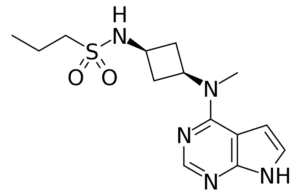
Abrocitinib chemical structure. Image courtesy of Wikipedia.
Pfizer (NYSE: PFE) recently announced that its once-daily oral Janus kinase 1 (JAK1) inhibitor abrocitinib bested Sanofi’s Dupixent (dupilumab) in a Phase 3 study focused on moderate to severe atopic dermatitis (AD).
Meanwhile, Sanofi (EPA:SAN) announced that a Dupixent pivotal trial met its primary and secondary endpoints, making it the first biologic to demonstrate significant reductions in moderate-to-severe atopic dermatitis symptoms in children down to six months of age.
Regeneron Pharmaceuticals (NSDQ: REGN) partnered with Sanofi in developing Dupixent. In July, both companies announced that Dupixent met all primary and second endpoints in a Phase 3 trial focused on moderate-to-severe chronic spontaneous urticaria (hives).
Last year, Dupixent generated more than $8 billion in total revenue.
The Pfizer study compared a 200-mg daily dose of oral abrocitinib to a 300-mg volume of subcutaneous dupilumab in adults.
FDA approved the monoclonal IgG4 antibody dupilumab for adults with moderate-to-severe atopic dermatitis in 2017.
FDA had delayed its approval decision for abrocitinib as a dermatitis treatment.
In the pivotal Phase 3 study of dupilumab, the drug met primary and secondary endpoints. Namely, it significantly reduced dermatitis symptoms, improving skin symptoms and itching compared to topical corticosteroids alone. The study focused on patients aged six months to five years of age.
Sanofi also noted that dupilumab recipients had a 50% lower incidence of skin infection than placebo recipients.